July 10, 2017
Katelyn Mills

About
|
Alumni |
| Degree |
Bachelor of Science in Applied Biology |
| Major |
Applied Animal Biology |
Applied Biology Undergrad Reviews Unnecessary Surgeries on Companion Animals
Katelyn Mills always planned to go into veterinary medicine. But as a student in our Applied Biology program, her career path took an unexpected turn after she enrolled in a research methods class with UBC Animal Welfare Profs. Nina von Keyserlingk and Dan Weary.
“I never thought a career in research was something I wanted, but that course changed things for me,” said Mills, who graduated with a BSc in Applied Biology in November 2015 and is now working as a Research Assistant in the UBC Animal Welfare program. “The Applied Biology program gave me the opportunity to design my degree, which is very different from other biological sciences programs."
Part of designing her degree meant that Mills had the freedom to work on a directed-studies project. Last year, she spent four months conducting a literature review of unnecessary surgeries on companion animals, the results of which were published in the January 2016 issue of The Journal of the American Veterinary Medical Association.
“There’s a lot of information on controversial surgeries that are not medically necessary or beneficial to the animal, like declawing or ear cropping, but there hadn’t been a review done on this topic before in companion animals,” she said. “We wanted to get all the information in one place as a starting point.”
Mills worked on the review under the supervision of Professor von Keyserlingk, and Dr. Lee Niel from the University of Guelph. She hopes the review will result in discussions about the welfare concerns of these procedures and eventually legislation that will outlaw these procedures. While there are currently no federal laws in place to prevent tail docking or declawing, provincially we’re starting to see small changes; ear cropping was recently banned in BC.
“While we know that procedures like tail docking or declawing are painful, little research has been done to determine how much pain these surgeries are causing, but in many cases they are done without anesthetics or analgesics,” she said.
Some of these surgeries have been performed since ancient times. In the Middle Ages, tail docking was performed on hunting and fighting dogs to lessen the risk of injury to the tail and is still commonly performed on dogs of various hunting, working, and terrier breeds.
“Breed advocates often believe they should have the right to uphold the integrity of breed standards,” Mills said. “But ultimately, the goal should be to change how people view these procedures and hopefully then we change the need for these unnecessary surgeries.”
Tagged with:
Tagged with
Categories: Uncategorized
July 10, 2017
Gladys Oka
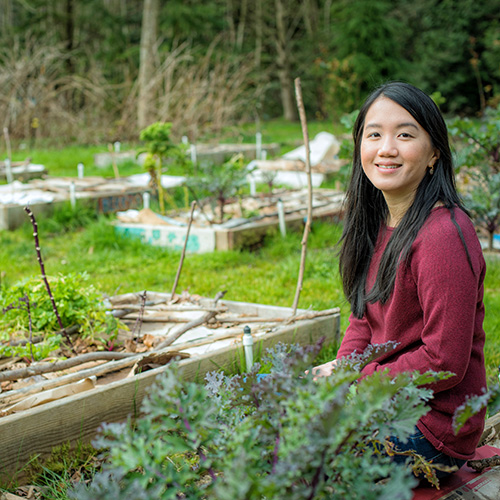
About
| Rank |
Masters of Science Candidate |
| Degree |
Masters of Science |
Elevated Toxic Metals at a Community Garden Site Raise Concerns
Elevated levels of toxic metals at a Vancouver community garden site raise questions about the city’s approach to promoting urban agriculture.
In research outlined in the Journal of Soil Science and Plant Nutrition, lead author Gladys Oka, an MSc candidate in our soil science program, detected elevated levels of zinc and lead in soil from a community garden site at 16th Avenue and Oak Street.
“My intention is not to say don’t plant, don’t do community gardens,” says Oka. “But I don’t think it’s necessarily in the best interest of Vancouver to push something without informing people of all the considerations they need to make.”
Native soil sampled from the garden site was found to have concentrations of 456 parts per million (ppm) of zinc, and 219 ppm of lead—exceeding background soil levels in the Lower Mainland of 200 ppm and 60 ppm respectively. Kentucky bluegrass, used as an indicator plant, was found to absorb the metals: the shoots of those grown on the garden site contained 1,330 ppm of zinc and 387 ppm of lead. The European Scientific Commission on Food recommends no more than 25 mg per day of zinc and no more than 0.03 mg per day of lead be ingested by a 60 kg person.
While the use of raised beds could mitigate contamination from the soil, Oka says readings of metals in the air are also a concern. Compared to the UBC Farm site, which the researchers also tested, there was eight times as much zinc and twice as much lead and copper in the air around the community garden.
“You can fix the problem of what’s happening in your surface soils by using compost, but if you’re growing in that for five years, you might be accumulating a lot of metals,” she notes.
Co-author Les Lavkulich, program director of the UBC Master of Land and Water Systems, calls for a measured approach to urban gardening. “Our research has shown that the potential for metal contamination is a concern. Before we start promoting things, we should make sure we have a relatively good idea of what we’re promoting.”
Oka’s research has led to a change in Vancouver Park Board policy. In February 2015,the Vancouver Parks Board announced that it will mandate that communicate gardens and local agriculture projects be planted in soil free of urban contaminants.
Tagged with:
Tagged with
Categories: Uncategorized
July 10, 2017
Desiree Nielsen

About
|
Alumni |
| Degree |
Bachelor of Science in Food Nutrition and Health |
| Major |
Dietetics |
Dietetics Alum Focuses on Preventing Disease Through Nutrition
Desiree Nielsen had an ‘aha’ moment around the link between food choices and health when her cousin, who has diabetes, came to live with her family when Nielsen was a teenager.
“It was the first time I’d encountered the concept of things to eat or not eat based on a medical condition. It got me thinking about the food you put in your body and how it can affect you,” she said.
It also ignited a desire to work in a health-related field. Nielsen entered our Dietetics program in 2001 with the idea that she might eventually going into medicine. But the further she got in the Dietetics program, the more she realized that what she really wanted to do was talk to people about nutrition. “There’s a huge power in helping people eat better to prevent disease as opposed to fixing them when they get sick.”
After graduating with her BSc in Dietetics (with honours) in 2006, Nielsen spent five years working as a Nutrition Manager for Choices Markets. These days, she works as a consultant and strives to teach people to have a healthier relationship with food, as well as to recognize the difference between food and what is just being marketed to us as food. “We’ve gotten away from the basic foods that are raised or grown from the ground and because of that, our health is suffering,” she said.
Nielsen is particularly interested in chronic inflammation, a risk factor for common health concerns including eczema, heart disease and diet-related obesity, and how the foods we eat can help lower inflammation. Her first book on the subject, UnJunk Your Diet: How to Shop, Cook and Eat to Fight Inflammation and Feel Better Forever!, was released in 2014.
Tagged with:
Tagged with
Categories: Uncategorized
July 10, 2017
Nicole Fetterly
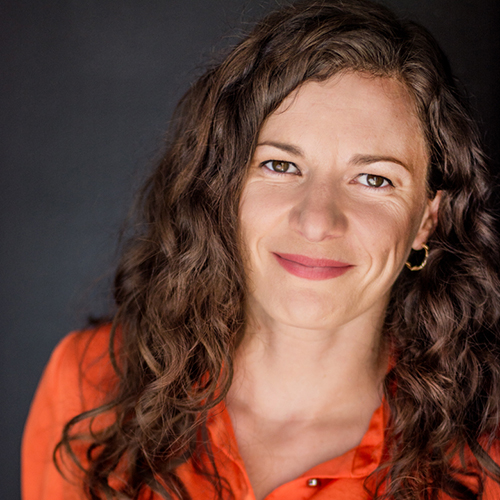
About
| Rank |
Alumni |
| Degree |
Bachelor of Science in Food Nutrition and Health |
| Major |
Dietetics |
Registered Dietitian
Nicole Fetterly has taken the nutrition world by storm. After graduating from the Dietetics program in the Faculty of Land and Food Systems in 2007, Fetterly worked for Vancouver Coastal Health in clinical dietetics and then as Nutrition Operations Manager at Choices Markets. She was named Star Woman in Grocery for 2015 by Canadian Grocer magazine.
Fetterly returned to UBC in October 2015 as the Nutrition & Wellness Manager in Student Housing and Hospitality Services on the Vancouver campus. She has been a large part of education outreach to students in residence and partly responsible for the increase of healthy food options on campus.
“Students are entering an amazing new phase of their lives and really establishing their independent relationship with food for the first time,” she said. “I felt I could have the most impact in a university environment.” And when it comes to UBC’s food choices on campus she believes it is “improving day by day.”
Thanks in part to Fetterly, the food choices have improved since the days when she herself was a student in the Dietetics Major, a program that uses an integrated, province-wide approach to prepare students for safe, effective and ethical entry-level dietetic practice. “The integrated dietetics program opened a lot of opportunities for me both within the Faculty and outside of UBC.”
One of Fetterly’s favourite parts of working with UBC is the Joy of Feeding event, an annual fundraiser in support of UBC Farm with a goal of raising awareness about the importance of cooking at home. She has been part of the steering committee for five years, bringing Choices Markets on board as a sponsor, and credits working on Joy of Feeding with helping her land her position at UBC.
So, what does the future hold? Nicole recently accepted a role as Coordinator for the Nutrition Programming & Services with the University of Victoria where she’ll be continuing the work she started at UBC. “I look forward to this new chapter with my family and the University of Victoria where I’ll continue to advocate for more sustainable food systems on campus.”
Tagged with:
Tagged with
Categories: Uncategorized
July 4, 2017
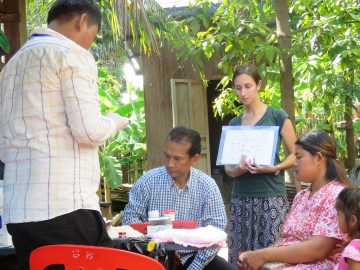
American Journal of Clinical Nutrition publishes alumna’s research findings
Congratulations to alumna Aviva Rappaport, whose paper “A randomized controlled trial assessing the efficacy of a reusable fish-shaped iron ingot to increase hemoglobin concentration among anemic rural Cambodian women” has been published in the American Journal of Clinical Nutrition.
Rappaport conducted this research while completing her Master of Science in Human Nutrition in the Faculty of Land and Food Systems (LFS), under the supervision of Affiliate Professor Tim Green. She also previously completed her Bachelor of Science in Food, Nutrition and Health at LFS.
Specifically, Rappaport’s research evaluated the efficacy of the Lucky Iron Fish in rural Cambodia in a year-long randomized controlled trial. The Lucky Iron Fish is an iron ingot meant to be added to cooking pots, mimicking the iron-releasing mechanism of cast iron pots and pans.
In this research, Rappaport discovered that the prevalence of iron deficiency varied with different biomarkers and that there is a low prevalence of iron deficiency in Cambodia based on serum ferritin concentrations, an appropriate measure of iron deficiency. These findings are consistent with other research findings from Cambodia, including work done by LFS Assistant Professor Crystal Karakochuk.
Importantly, after six months of participants using the Lucky Iron Fish versus iron supplements, Rappaport found that serum ferritin concentrations were lower in the participants using the Lucky Iron Fish compared to those taking iron supplements. These findings were not maintained after 12 months. Rappaport’s conclusion was that the use of the Lucky Iron Fish should not be recommended in Cambodia or in countries where the prevalence of iron deficiency is low and genetic hemoglobin disorders are high.
Aviva Rappaport is currently working as a Research Assistant at the Centre for Global Child Health at SickKids Hospital in Toronto, ON. In addition, she works as a consultant for the HEmoglobin MEasurement (HEME) working group within SPRING Nutrition.
Tagged with:
Tagged with
Categories: Uncategorized
July 1, 2017
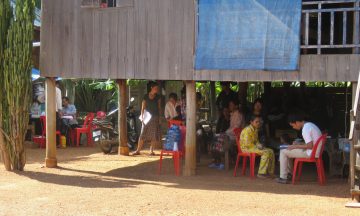
LFS Alumna’s Research Paper Published in the American Journal of Clinical Nutrition
Jul 4, 2017
Congratulations to alumna Aviva Rappaport, whose paper “A randomized controlled trial assessing the efficacy of a reusable fish-shaped iron ingot to increase hemoglobin concentration among anemic rural Cambodian women” has been published in the American Journal of Clinical Nutrition.
Aviva conducted this research while completing her Master of Science in Human Nutrition in the Faculty of Land and Food Systems (LFS), under the supervision of Dr. Tim Green. She also previously completed her Bachelor of Science in Food, Nutrition and Health at LFS.
Specifically, Aviva’s research evaluated the efficacy of the Lucky Iron Fish in rural Cambodia in a year-long randomized controlled trial. The Lucky Iron Fish is an iron ingot meant to be added to cooking pots, mimicking the iron-releasing mechanism of cast iron pots and pans.
In this research, Aviva discovered that the prevalence of iron deficiency varied with different biomarkers and that there is a low prevalence of iron deficiency in Cambodia based on serum ferritin concentrations, an appropriate measure of iron deficiency. These findings are consistent with other research findings from Cambodia, including work done by LFS Assistant Professor Crystal Karakochuk.
Importantly, after six months of participants using the Lucky Iron Fish versus iron supplements, Aviva found that serum ferritin concentrations were lower in the participants using the Lucky Iron Fish compared to those taking iron supplements. These findings were not maintained after 12 months. Aviva’s conclusion was that the use of the Lucky Iron Fish should not be recommended in Cambodia or in countries where the prevalence of iron deficiency is low and genetic hemoglobin disorders are high.
Aviva Rappaport is currently working as a Research Assistant at the Centre for Global Child Health at SickKids Hospital in Toronto, ON. In addition, she works as a consultant for the HEmoglobin MEasurement (HEME) working group within SPRING Nutrition.
Tagged with:
Tagged with
Categories: Uncategorized
June 28, 2017
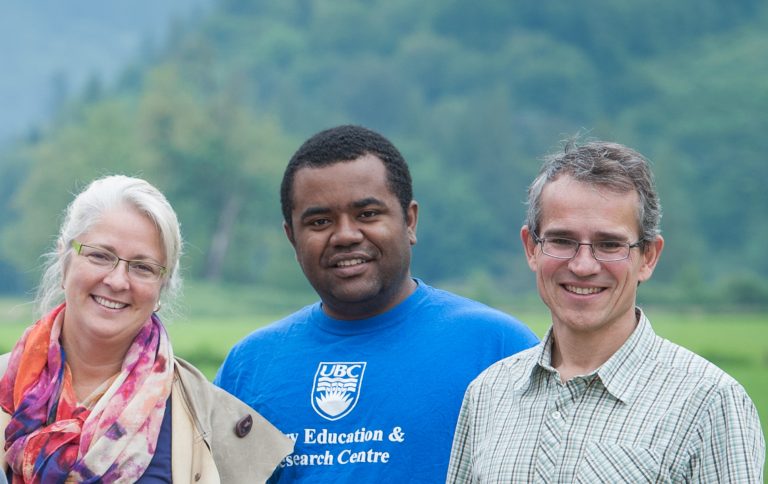
João HC Costa, Post-Doctoral Fellow, Appointed Assistant Professor at the University of Kentucky
June 28, 2017
Congratulations to LFS alum João Henrique Cardoso Costa, who has recently been appointed Assistant Professor of Dairy Research and Training, with the Department of Animal and Food Sciences at the University of Kentucky.
João joined the Animal Welfare Program at UBC in 2012 as a Ph.D. student, and graduated in 2015. Since then, he has continued at the Faculty as a Post-Doctoral Fellow under the supervision of Professors Dan Weary and Nina von Keyserlingk.
Tell us about your research.
My research is focused on animal welfare and applied animal behavior, especially in dairy cows and calves. During my Ph.D., I focused on understanding the development of feeding behaviour and nutrition of calves and how to raise calves in groups successfully.
Your studies and now your career have taken you far from your home. Can you tell us about your decision to come to UBC?
I did my undergraduate and master degree at the Federal University of Santa Catarina, in southern Brazil.
UBC is a leading institution in research and the Animal Welfare Program at the Faculty of Land and Food Systems gave me the opportunity to participate in world-class research in my area of interest. Also, the access to the Dairy Centre in Agassiz, is one of the best dairy research centres in the world – it was a huge factor in my decision to come here.
What does the next step at the University of Kentucky look like?
My career objective is to join the dairy program at the University of Kentucky and be part of the great group that is there. I hope to contribute to creating a research and extension program, with emphasis on applied animal behaviour and nutrition related to animal welfare and sustainability concerns, and to create an inspirational learning environment that motivates graduate and undergraduate students to learn about sustainable animal production systems.
Best of luck, João!
See more stories like this:
Tagged with:
Tagged with
Categories: Uncategorized
May 21, 2017
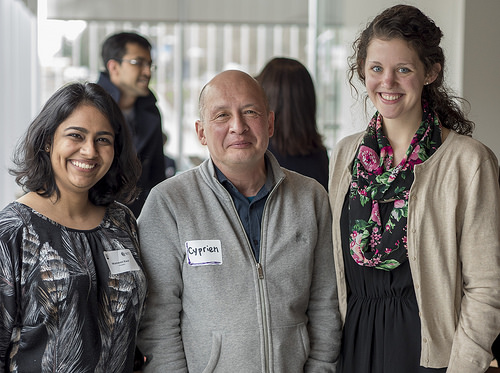
Manveen Kaur, MSc student, wins UBC 3MT Competition
June 28, 2017
On March 16, Manveen Kaur, a MSc student in the Applied Animal Biology program at the Faculty of Land & Food Systems, was one of eight graduate students at UBC to compete in the finals of the 2017 Three Minute Thesis (3MT) Competition. The title of her presentation was the “Effect of fat protected Vitamin B supplementation on bovine uterus.”
The first challenge was turning two years worth of work on their research project into a three minute speech, or about 450 words. The second was to keep it jargon-free and to present it in an interesting way for an audience with little or no experience in the topic. They were only allowed one slide.
At first, Manveen saw the 3MT as a good opportunity to develop her oral presentation skills. “It wasn’t until after I gave my speech and found out I won that I realized I was in a competition.”
Manveen entered the competition alongside her friend and fellow MSc student Laura Whalin, in the Animal Welfare program. “We were at the same meetings and we were able to bounce ideas off of each other.” It was the support from her fellow students and the LFS Learning Centre that helped Manveen and Laura reach the UBC finals.
For the second time, the LFS Learning Centre offered coaching and training sessions for grad students interested in the competition.An important part of that time was dedicated to getting the students feeling confident while talking about their research.
“In the Learning Centre, we believe that the ability for students to communicate effectively is an essential skill to have” says Cyprien Lomas, Assistant Dean, Learning Technologies. “Part of the coaching sessions we offered for the 3MT competition was to help grad students figure out why their research was important to them. Once they found that answer, it allowed for their passion to come out in their presentation and they really shined.”
Manveen will go on to represent UBC at the 2017 Western Regional 3MT Competition on April 28 in Saskatoon, Saskatchewan. The regional competition will be live streamed at 11:00am PDT. Be sure to watch and vote for Manveen in the People’s Choice ballot!
Tagged with:
Tagged with
Categories: Uncategorized
May 3, 2017

Students in LFS 450
May 3, 2017
In LFS 450, students are given complex case studies which aim at increasing the sustainability of the UBC Vancouver campus food system. This year, two groups were able to find a solution for recovering food waste and helping their fellow students in need.
One group of students was tasked with working with the AMS Food Bank, which opened in 2006 as a non-profit organization. The Food Bank is experiencing an increasing demand of its services from both new and returning students and sometimes struggles to obtain donations that are rich in nutrients, carbohydrates and proteins. The goal was to increase partnerships to provide regular donations to this student-run organization.
Another group of students in the class focused on the issue of food recovery. Working with chefs on campus, these students quantified and identified food that can be recovered from various UBC Food Services locations. Both projects culminated in historic events for the food system on campus.
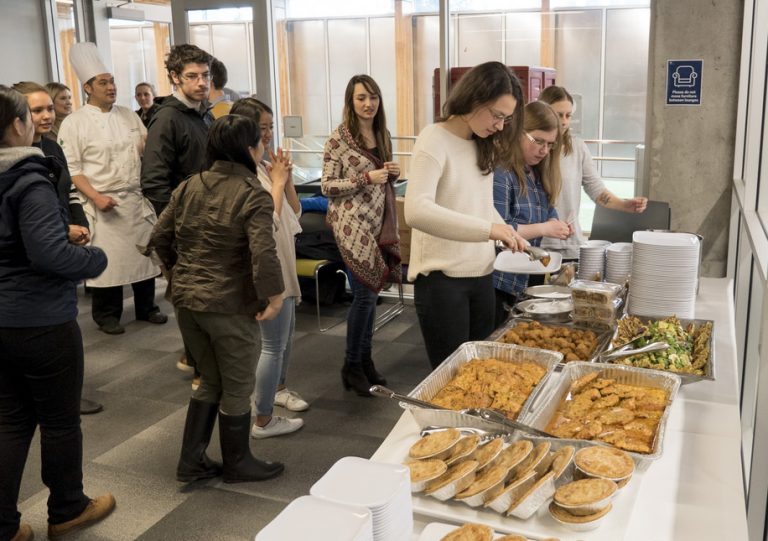
On March 28th, 2017, the first hand-off of excess food from UBC Food Services to the AMS Food Bank occurred. Some of the donated food included soup, cut vegetables, bread and pastries. Food retail outlets usually set a criteria for the physical appearance of their food, especially for fresh produce, and anything that falls short is tossed. The students were able to prevent edible food from being sent to compost or the landfill and direct it to the hands of struggling students on campus.
And on April 5th, the students sat down for a buffet of food – food which had been recovered by the students themselves the day before and cooked for them by chefs from Student Housing and Hospitality Services. In total, the students found 20 kilos of edible food from three residence kitchens, two restaurants and four retail outlets. Going forward, the recovered food will go to the AMS Food Bank to feed students in need.
“This is really a recognition of the reality of food insecurity on campus and the importance of repurposing perfectly edible food for social and environmental reasons” says Marie-Claude Fortin, Lecturer of LFS 450. “This is the first of many weekly donations to come, an event worth celebrating since it increases both the social and environmental sustainability of the UBC campus food system.”
Tagged with:
Tagged with
Categories: Uncategorized
May 2, 2017
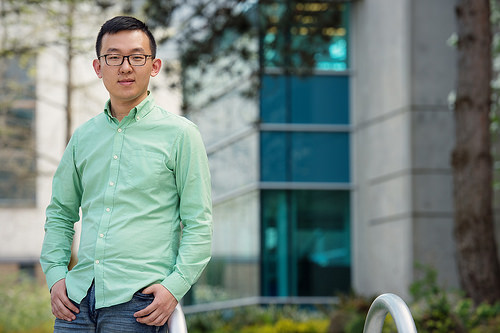
Xiaonan Lu Receives Larry Beuchat Young Researcher Award
May 2, 2017
Congratulations to Assistant Professor Xiaonan Lu on receiving the Larry Beuchat Young Researcher Award from the International Association of Food Protection. This special award is presented to a young researcher who has shown outstanding ability and professional promise in the early years of their career.
Tagged with:
Tagged with
Categories: Uncategorized










